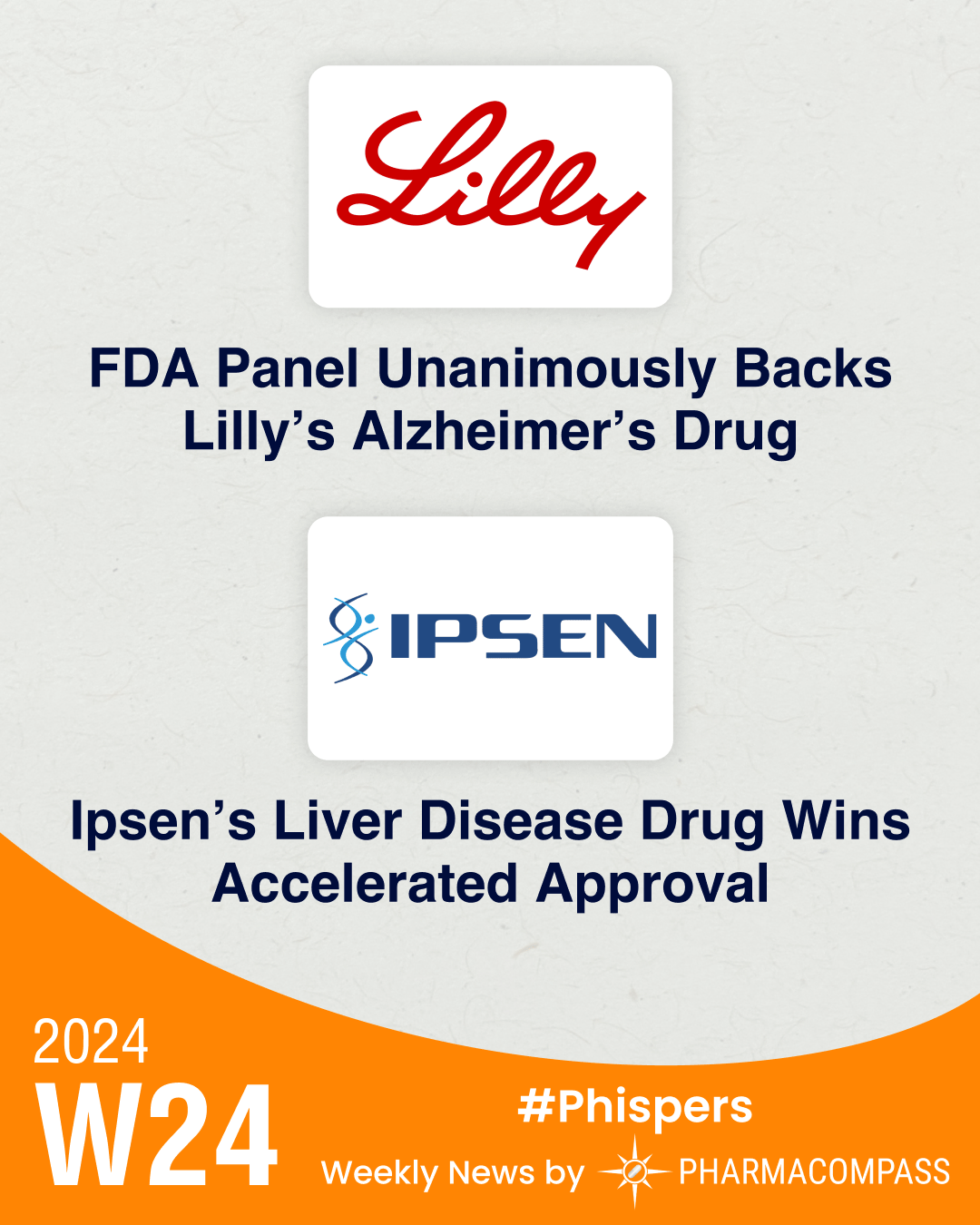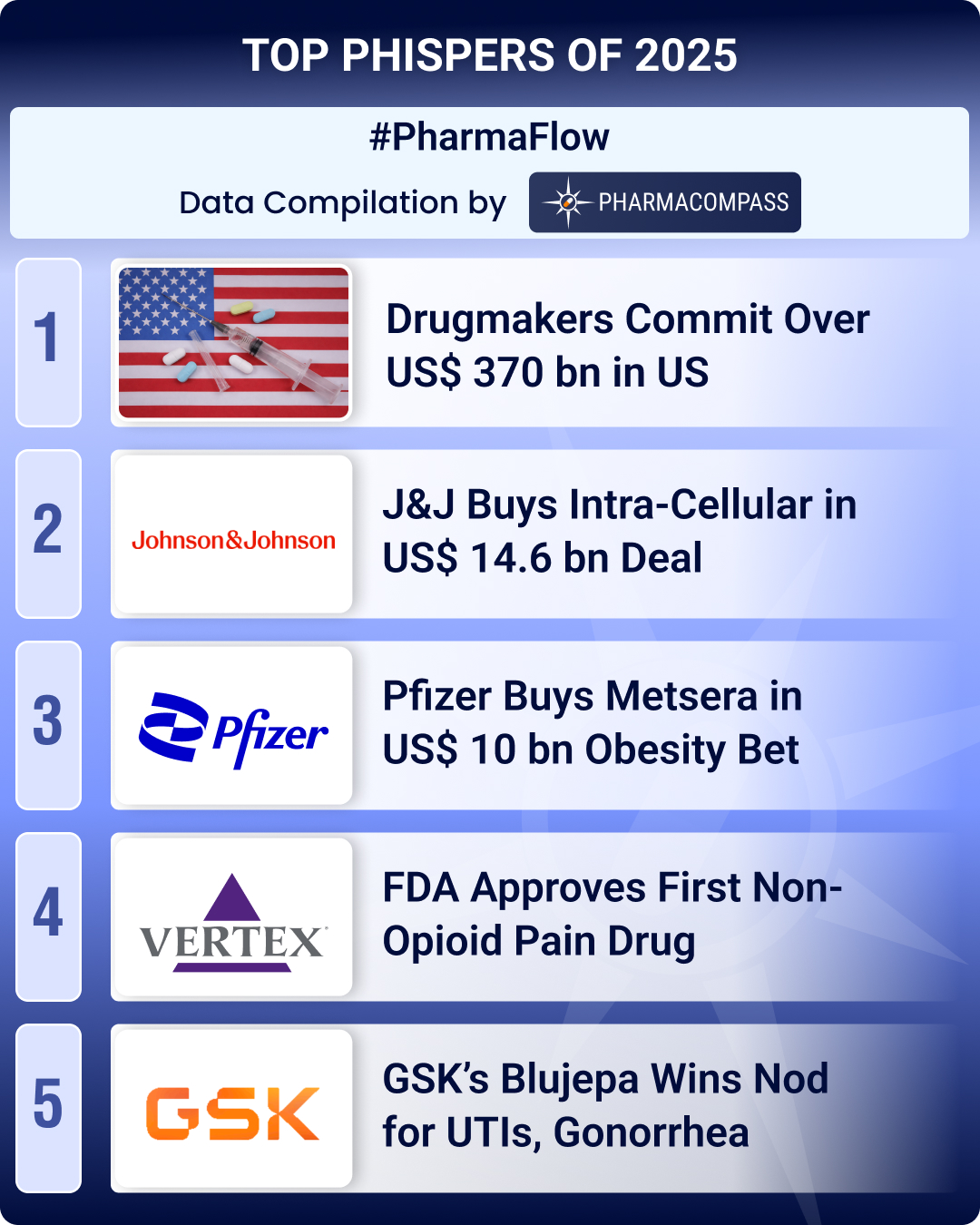
By PharmaCompass
2024-06-13
Impressions: 1,108 Article || 6 Video
The US Food and Drug Administration’s (FDA) advisory committee has voted unanimously in favor of the benefits of Eli Lilly’s Alzheimer’s drug donanemab outweighing its risks. FDA has also granted accelerated approval to Ipsen’s Iqirvo to treat a rare liver disease (primary biliary cholangitis) that has not seen a new therapy approved in nearly a decade. Moreover, FDA handed Geron Corporation its first approval for blood disorder drug Rytelo.
In vaccine news, Moderna’s combination vaccine against influenza and Covid elicited a higher immune response compared to separate shots in people aged 50 and above. Also, adults aged 50 to 59 years now have an RSV vaccine after FDA expanded the use of GSK’s Arexvy to include this age-group.
In a blow to millions who are affected by long Covid, Pfizer’s Paxlovid did not appear to improve its symptoms as was hoped, according to a study undertaken by Stanford University. In yet another blow to Pfizer, its experimental gene therapy — fordadistrogene movaparvovec — failed to improve motion function in patients with Duchenne muscular dystrophy (DMD) in a late-stage trial.
In regulatory news, FDA has chided China’s Jiangsu Hengrui in a Form 483 after employees destroyed documents during an inspection. And Johnson & Johnson has reached a US$ 700 million settlement with 42 US states and Washington, DC, over allegations that it misled consumers into believing its talc products were safe.
Lilly’s Alzheimer’s drug donanemab wins unanimous backing of FDA’s expert panel
An FDA advisory committee has voted unanimously in favor of the benefits of Eli Lilly’s Alzheimer’s drug donanemab outweighing its risks. Alzheimer’s disease afflicts over six million people in the US and has no cure. However, donanemab modestly slowed cognitive decline in early-stage patients but came with noteworthy risks including swelling and bleeding in the brain. The Alzheimer’s Association has welcomed the unanimous voting by the panel in favor of the drug.
Ipsen’s Iqirvo bags FDA nod to treat rare liver disease; Geron gets first FDA approval
FDA has granted accelerated approval to Ipsen’s Iqirvo (elafibranor) to treat the rare liver disease known as primary biliary cholangitis (PBC). The decision renders Ipsen’s first-in-class peroxisome proliferator-activated receptor (PPAR) agonist the first new medicine approved in nearly a decade for the treatment of PBC. Iqirvo is taken orally once a day and is estimated to cost US$ 11,500 a month. PBC affects about 100,000 people in the US and can cause liver failure. It mostly affects women aged 30 to 60 years.
Iqirvo was discovered and developed by Genfit to treat the fatty liver disease, now known as metabolic dysfunction-associated steatohepatitis (MASH). But after flopping in phase 3 trial, it joined the graveyard of MASH failures. Ipsen then licensed it from Genfit for up to € 480 million (US$ 515 million) to treat PBC.
Geron’s maiden approval: FDA has signed off on Geron’s Rytelo (imetelstat) for treating transfusion-dependent anemia in patients with low- to intermediate-risk myelodysplastic syndromes (MDS), a group of blood cancers. This is the first FDA approval for Geron since its inception in 1990. The use of BMS’ Reblozyl (luspatercept) was expanded last year by the FDA to treat the same disease indication. However, this is reportedly an underserved population.
Moderna’s two-in-one Covid-flu vaccine superior to individual shots, says study
Moderna said mRNA-1083, an investigational combination vaccine against influenza and Covid, elicited a higher immune response compared to separate shots in people aged 50 and over. A late-stage study saw the messenger RNA technology-based combination generate more antibodies than currently marketed flu vaccines and Moderna's Spikevax.
FDA okays GSK’s RSV vaccine for adults aged 50 to 59: FDA has expanded GSK’s respiratory syncytial virus (RSV) vaccine to be administered in adults between the ages of 50 and 59 years. This makes Arexvy the only RSV shot endorsed for that age group and is expected to add 13 million individuals to its eligibility pool. Arexvy has been dominating the US market since its launch in 2023, outperforming sales of its rival Pfizer’s Abrysvo.
Pfizer’s Paxlovid fails long Covid test, its DMD gene therapy flunks phase 3 study
In a blow to millions affected by long Covid, Pfizer’s Paxlovid did not appear to improve the symptoms as was hoped. Pfizer’s antiviral treatment was shown to be safe in a 15-day study conducted by Stanford University. However, it didn’t lower select symptoms of the syndrome. Long Covid symptoms include fatigue, brain fog and the inability to exercise and scientists don’t yet know exactly what causes it.
In yet another blow to Pfizer, its experimental gene therapy fordadistrogene movaparvovec failed to improve motion function in patients with DMD in a late-stage trial. The therapy did not show a significant improvement compared to a placebo with regard to the trial’s primary and secondary endpoints.
China’s Jiangsu Hengrui issued scathing Form 483 after staff destroys documents
FDA has admonished China’s Jiangsu Hengrui Pharmaceuticals after an employee “diverted” inspectors while colleagues tore up and discarded documents. The employee called ahead as soon as FDA sought access to the waste area and then led inspectors down a long route. On arriving, FDA observed “personnel in a rapid-like manner placing documents in the waste bin, along with approximately 2 to 3 other individuals watching,” a Form 483 said. FDA also “observed black mold like growth on the floor below and around the condenser, which are approximately a foot from released finished drug products.” Following the January inspection at the manufacturing site in the Chinese city of Lianvungang (Jiangsu province), FDA issued a Form 483 with eight observations.
J&J to pay US$ 700 mn to US states over allegations of misleading talc customers
Johnson & Johnson has reached a US$ 700 million settlement with 42 US states and Washington, DC, over allegations that it misled consumers into believing its talc products were safe. This puts to bed an investigation into its marketing of baby powder and other talc-based products, which J&J had sold for over 100 years. The products in question were alleged to have caused cancer. J&J still faces tens of thousands of lawsuits related to its talc.
The PharmaCompass Newsletter – Sign Up, Stay Ahead
Feedback, help us to improve. Click here
Image Credit : Phisper Infographic by PharmaCompass license under CC BY 2.0
“ The article is based on the information available in public and which the author believes to be true. The author is not disseminating any information, which the author believes or knows, is confidential or in conflict with the privacy of any person. The views expressed or information supplied through this article is mere opinion and observation of the author. The author does not intend to defame, insult or, cause loss or damage to anyone, in any manner, through this article.”







